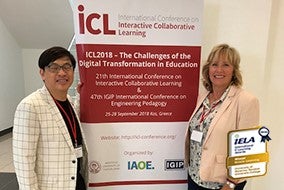The Canadian Institutes of Health Research recently awarded a grant to study Grief and Grief Support Needs in Canada, a project led by Dr. Susan Cadell.
There has never been a more important time to understand and normalize grief. In their lifetime, almost every person will experience the loss of someone they care about. The COVID-19 pandemic and the ongoing opioid crisis have brought this into particular focus. Despite the inevitability, grief remains a stigmatized and relatively hidden issue. Neither research nor practice has adequately grappled with how our services and our society can truly help. Ultimately, the research will contribute to the improving the lives of all of those who grieve by providing evidence to inform the provision of services and by increasing grief literacy.
This is the first study to seek to test the Australian Public Health Model of Bereavement Support in a post-pandemic context and in a country in which Medical Assistance in Dying is legal. Susan will lead the mixed methods project along with co-PIs Dr. Mary Ellen Macdonald (J & W Murphy Foundation Endowed Chair in Palliative Care, Dalhousie University) and Dr. David K. Wright (Nursing, University of Ottawa) and a team of co-investigators and collaborators.
The Social Sciences and Humanities Research Council funded a project entitled (Re)Marked: Holocaust Commemorative Tattoos in a Time of Renewed Antisemitism.
It is co-led by Drs. Susan Cadell and Reisa Klein (University of Alberta).
The goals of the research are to document commemorative Holocaust tattoos and to better understand their meanings. Holocaust tattoos as those that copy their ancestors’ concentration camp tattoos, and/or other Nazi-imposed symbols, such as the Star of David, as new sites of public Holocaust memory. The aim is to understand this emerging occurrence and the personal and cultural meaning of these tattoos in a contemporary context.
(Re)Marked refers to the embodied memorialization by 2nd, 3rd, and 4th generation Holocaust survivors of the markings that the Nazis imposed on Jews during the Holocaust, such as the yellow Star of David or number tattoos in the Auschwitz concentration camp. The (Re) connotes a re-membering, re-claiming and re-appropriating of these imposed markings by choosing to have these symbols tattooed on bodies as new forms of public Holocaust memory. The (Re)Marked project refers to (re)telling the stories of Holocaust victims and survivors while also providing commentary on Jewish identity in contemporary culture, particularly within a context of rising antisemitism.
First National Study on 2SLGBTQ+ Poverty in Canada - Dr. Andrea Daley, Co-applicant
The Social Sciences and Humanities Research Council of Canada (SSHRC) announced a Partnership Grant of $2.5 million awarded to the “2SLGBTQ+ Poverty in Canada: Improving Livelihood and Social Wellbeing” study. Over the next six (6) years this project will study both the extent and effects of poverty on 2SLGBTQ+ communities across Canada, and importantly produce an evidence-based action plan that will assist governmental agencies, non-profits, and private organizations to address poverty therein. This is the first national study on 2SLGBTQ+ poverty in Canada.
Dr. Andrea Daley is a co-applicant and is the academic co-chair of the qualitative team. In this role, Andrea will be overseeing the qualitative phase of the project with a community-based co-chair, including 100 individual interviews and 13 focus groups with 2SLGBTQ+ people who have experienced poverty or are experiencing poverty.
This study is led by activist-scholar, Project Director, Dr. Nick Mulé, Professor in the Faculty of Liberal Arts & Professional Studies, based in the School of Social Work and cross-appointed to the School of Gender, Sexuality and Women’s Studies, where he is Coordinator of the Sexuality Studies Program at York University.
Anytime, Anywhere Academic Integrity App wins International Award
Educational institutions often struggle to identify what is the best pedagogical approach to engaging students with academic integrity (AI) content. Developed as part of university-wide research study on academic integrity, Integrity Matters app aims to enhance student academic integrity knowledge and understanding using an innovative pedagogical approach.
Dr. Alice Schmidt Hanbidge,

project principal researcher and faculty in the School of Social Work and Tony Tin, project technical lead and Renison’s Librarian, accepted an international academic e-learning award from the International E-Learning Association (IELA). The AI research team developed Integrity Matters, the Foundations for Academic Success App, to introduce the tenets of academic integrity to students for any time, anywhere learning in a meaningful way.
Integrity Matters tri-lingual (English, French, Chinese) mobile app can be readily used and adapted worldwide across post-secondary colleges and universities. Best strategies, from over 1,000 undergraduate student users, for learning this information with mobile technology (m-learning) were explored. Six lessons include diverse student life scenarios, animated videos, interactive exercises and games. Upon successful completion of the lessons and quiz, students are awarded an e-certificate and a digital badge.

To download the free Integrity Matters, Creative Commons 4.0 Licensed app, follow one of the links below.
Dr. Alice Schmidt Hanbidge, MSW, RSW, PhD is an Associate Professor in the School of Social Work, Renison University College. Email: ashanbidge@uwaterloo.ca